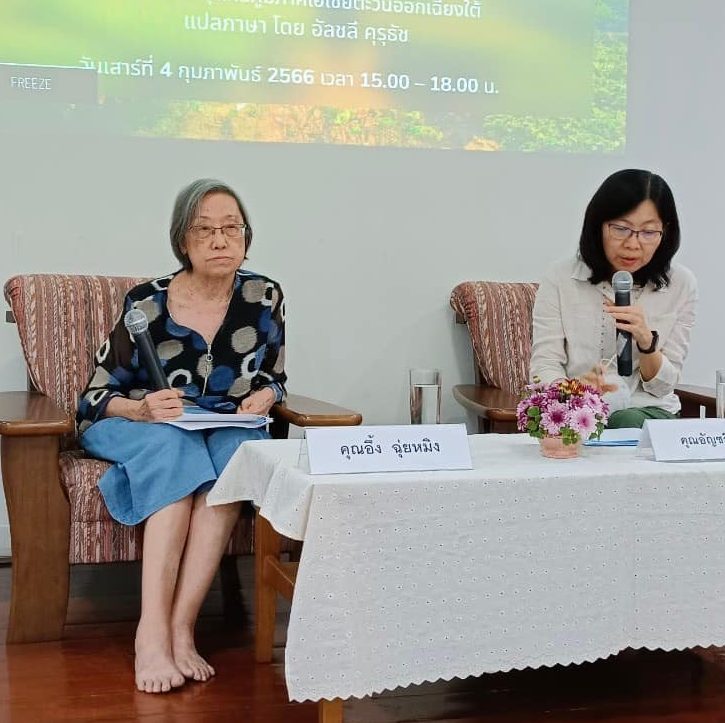ปาฐกถาโดย อึ้ง ฉุ่ยหมิง

ปาฐกถาเสมพริ้งพวงแก้ว ครั้งที่ 28 วันเสาร์ที่ 4 กุมภาพันธ์ 2566
TRANSFORMATIVE EDUCATION FOR SOCIAL JUSTICE จุดยืนทางการศึกษาเพื่อความเป็นธรรม .
ปาฐกถาโดย อึ้ง ฉุ่ยหมิง นักพัฒนาอาวุโสในภูมิภาคเอเชียตะวันออกเฉียงใต้
แปลภาษาโดย อัญชลี คุรุธัช
Good afternoon, respected attempts to luck and all of you here this afternoon. I’m very grateful to be here with you this afternoon, and particularly I’m honored to be asked to give this same lecture, the 28th same lecture here today.
Today’s topic on transformation, transformative education for social justice, is really a very challenging one because today’s world is very complex, with many societies experiencing divisions in Austria’s.
Of life politically, socially, environmentally, spiritually. And when we look around, we cannot help but ourselves. What has gone wrong? Today? Our world is richer and technologically more advanced than ever before, yet we seem to be mired be even greater levels of inequality.
Greed, hatred, social breakdown, environmental collapse, rampant violation of rights, injustice and pandemics of a global proportion. Governments around the world, especially in our ASEAN region, have reacted to this problems not by being more inclusive or more consultative, but they have become more authoritarian.
And military. So the fundamental issue is how do we get out of this kind of toxic environment and how do we ordinary citizens overcome such challenges? I assume many of you, especially the young people, are here because you want answers to many of the questions and the challenges we face, especially those of you who.
Including myself, who have been very fortunate to participate in the spirit of education movement work. I think we are in the right place to learn and to address our issues and hope. So we are here today to explore how we can use transmitted principles and education.
To address some of the issues and challenges we face today, first let’s look at the failure of our current education system. As you know, I’ve spent most of my life working for UNICEF, supporting various countries and governments to improve basic education.
I believe that it is the right of every child to have a basic education, and I also believe it is the obligation of every government to provide the right conditions for their children and their citizens to have a basic education. But I eventually realized that most of the governments are only interested in using education.
To equip the citizens with knowledge and skills in literacy, numeracy and technical competencies to enter the workforce. A few from the elite parts of society are given opportunities to be trained to become leaders in politics, in the industry or in the economic field.
They become the few leaders and thinkers to lead us. But the most important role of education is to produce lawyer and compliant citizens of the state, and the role of international NGOs and the UN and so on is to provide money and funds to this governments so they can build more schools, print more textbooks.
And continue the system of just brainwashing their citizens. This is why of all the government ministries, the Ministry of Education is one of the most difficult ministries to convince to embark on any kind of reform, whether this is reform about changing the curriculum, revising the textbooks.
Or providing more open systems of education. The more authoritarian the government, the more difficult it is to engage the education officials in any debate about positive change. In the interest of the learners, the disadvantage and the minorities, then I have first hand experience.
Of this because I work for years trying to talk to government officials, to get them to do, to to engage in more reforms. But I fail. And it is not just authoritarian governments who resist change. Even more liberal governments and the more liberal societies they continue to resist any form of positive change.
Because the interest of most governments and states is to brainwash a citizen to confirm the state’s dominant ideology and value system, which is to make the citizens more nationalistic, more loyal, to ensure national stability and support mainstream economic development.
I mean all of you here. You’re here partly because you’re not satisfied with this kind of education you want.